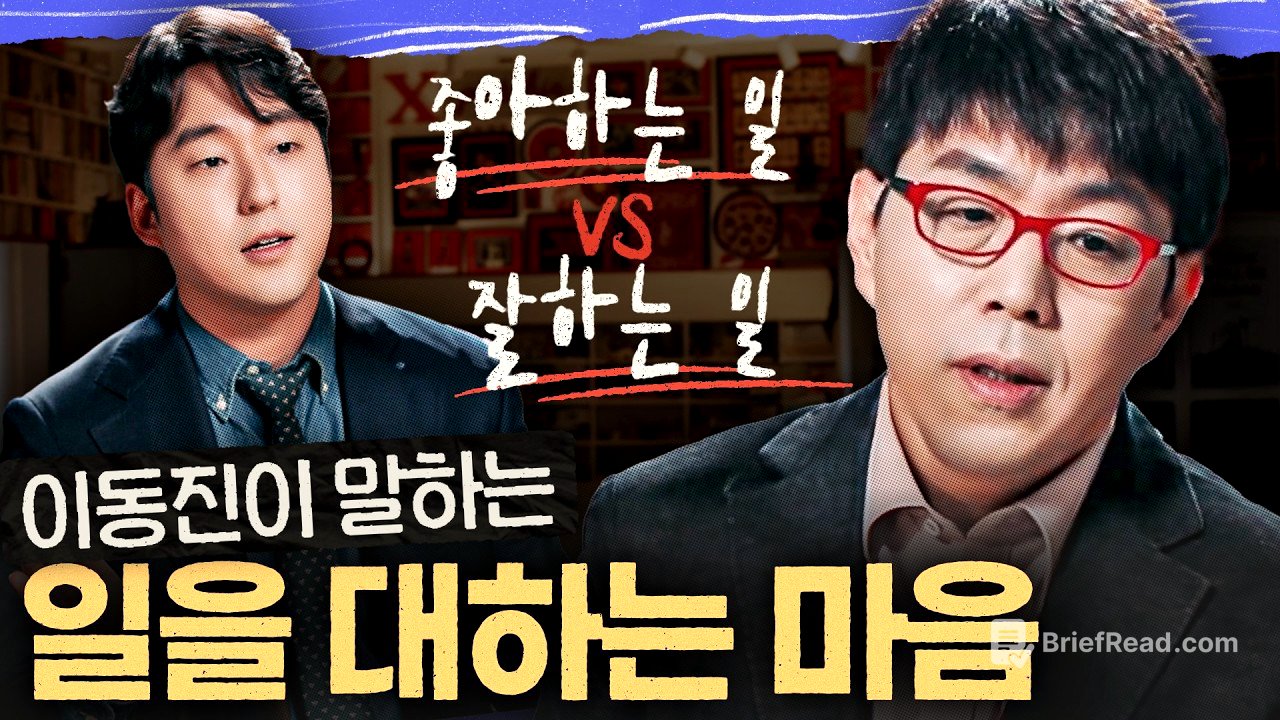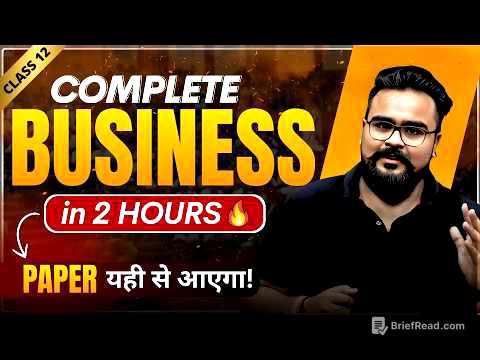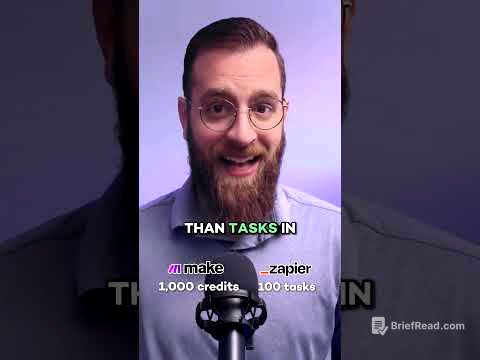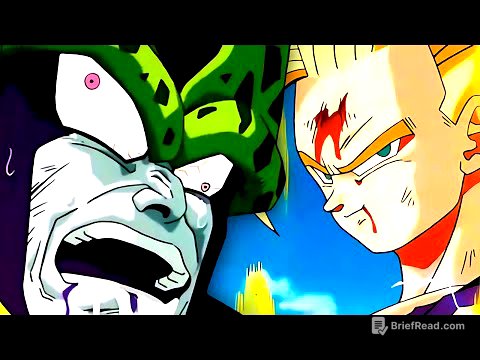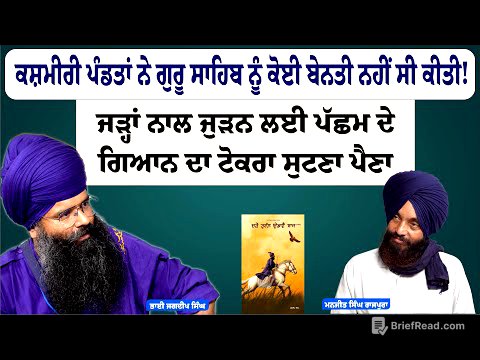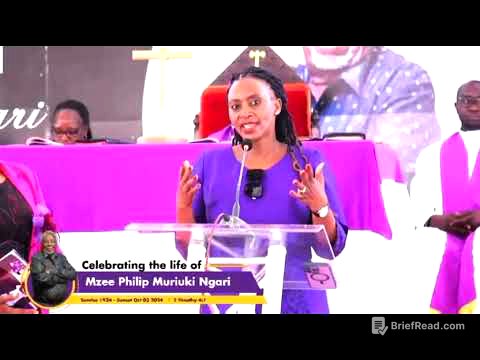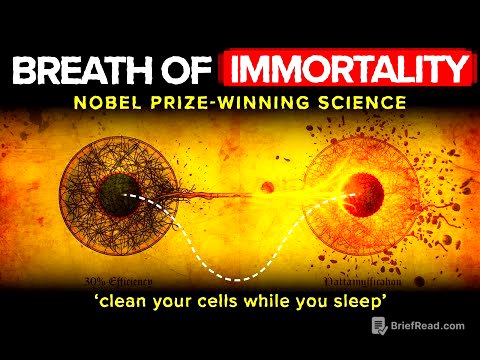TLDR;
This video features a conversation about work ethic, principles, and attitudes towards labor. The discussion covers the importance of understanding the context of one's work, maintaining self-control, and prioritizing competence over personality in colleagues. It also touches on the balance between doing what one likes and what one is good at, managing expectations, and the role of professional ethics.
- Understanding the context of work is crucial for success.
- Maintaining self-control and a sense of authority in one's work is important.
- Prioritizing competence over personality can be beneficial in a work environment.
- It's better to focus on what you are good at, rather than what you like.
- Pessimistic attitude can be a self-defense mechanism.
Introduction to the Discussion on Work Ethic [0:19]
The host and critic begin a serious discussion about attitudes toward work, a topic they realize they haven't addressed in their six years of broadcasting. The host expresses curiosity about the critic's work ethic and principles, acknowledging the critic's extensive experience and knowledge. The critic admits to feeling nervous due to the host's familiarity with his work habits, making it difficult to present a fabricated image.
Current Work and Past Experiences [1:52]
The critic shares that he is currently trying to reduce his workload due to health reasons, focusing on projects like "Paiakea" and "Raffle Weekly," as well as a program with Anmo. He also mentions his past jobs, including excessive tutoring, construction work, business ventures, and working as a DJ. He spent 13 years as a journalist, primarily covering films, before transitioning to a freelance film critic.
Qualities of Successful Individuals [4:52]
The critic believes that successful individuals possess a "sense of work," understanding the broader context of their roles. They consider not only their tasks but also how they interlock with others and the overall structure of their workplace. This involves having a big-picture perspective and the ability to observe and control one's circumstances.
Balancing Skills and Personality in the Workplace [7:53]
The discussion shifts to the balance between skills and personality in the workplace. While an ideal colleague would excel in both areas, the critic suggests prioritizing competence, even if it means tolerating a somewhat difficult personality. He emphasizes the importance of doing a good job and maintaining a professional distance, even in friendly relationships.
Preparation vs. Improvisation [9:57]
The conversation explores the importance of thorough preparation versus the ability to improvise in work situations. The critic argues that in most routine tasks, consistent performance is more critical than improvisational skills. He suggests that frequent crises indicate a problematic work environment, where improvisation becomes a daily routine rather than an exception.
Passion vs. Competence [11:10]
The discussion addresses the dilemma of prioritizing what one likes versus what one is good at. The critic suggests that choosing something one is good at increases the likelihood of happiness, as human desires are subject to change. He notes that professional satisfaction often stems from achieving results and receiving praise, making competence a more reliable path to enjoyment.
Managing Expectations and Desires [15:58]
The critic shares his approach to managing expectations and desires in his work. He admits to having a pessimistic outlook, which helps him avoid disappointment and maintain satisfaction. By setting low expectations, he often finds that the outcomes exceed them. He emphasizes the importance of effort and luck in his career, viewing his pessimistic attitude as a self-defense mechanism.
The Importance of Principles [19:27]
The conversation highlights the importance of principles in the critic's work. He emphasizes the need to evaluate films based on what he sees and to maintain a lower limit of professional ethics. This involves avoiding decisions based on external pressures and ensuring that his evaluations reflect his genuine opinions.
Maintaining Principles and Professional Ethics [22:38]
The critic discusses the challenges of maintaining principles, especially when faced with restrictions and limitations. He emphasizes the importance of watching a movie before rejecting it, with exceptions for political films. He also shares that he quit his job due to constant clashes between company expectations and his professional ethics.
Work-Life Balance [28:35]
The discussion shifts to work-life balance, a concept the critic finds somewhat odd. He argues that work is inherently difficult and that the term "work-life balance" implies that work is separate from life. He suggests that finding joy and fulfillment in work is essential, as it occupies a significant portion of one's life.
The Nature of Labor [36:32]
The critic reflects on the alienating quality of labor, viewing it as a punishment. He notes that everything he does is woven around his work, blurring the lines between work and leisure. He acknowledges the systemic problems associated with labor but also recognizes its instinctive nature.
Saying No and Maintaining Control [37:41]
The critic emphasizes the importance of saying no, especially as a freelancer. He shares that he left his job to regain control over his work life and avoid doing things he didn't want to do. He acknowledges that while it's impossible to do only what one wants, it's crucial to avoid summer work and maintain personal boundaries.
Dealing with Unpleasant People [40:31]
The conversation addresses the challenge of dealing with unpleasant people at work. The critic shares advice from a director who suggested liking people when necessary, viewing it as a form of self-deception that can play a proper social role. He also suggests quitting a job if the conflicting relationship is fatal and long-term.
Taking a Step Back and Confirming Existence [46:11]
The critic reflects on how taking breaks from his main job, such as his time as a visiting researcher in the US and his work with the union, allowed him to gain perspective and confirm his existence. He shares that these moments of distance helped him realize the possibility of other lives and better understand himself.
Freelancing and Anxiety [52:08]
The critic discusses the anxieties of freelancing, including job insecurity and the need to constantly adapt. He acknowledges that while freelancing offers freedom, it comes at the price of anxiety. He also expresses gratitude for his partnership with SK Broadband and the sense of belonging he feels with the Phaeacia team.
Movie Recommendation: Waikiki Brothers [53:44]
The critic recommends the movie "Waikiki Brothers," which explores the hardships and fatal characteristics of a job. The film follows a rock band formed in high school and the challenges they face as they grow older. The critic notes that the movie poignantly relates these challenges to life.
